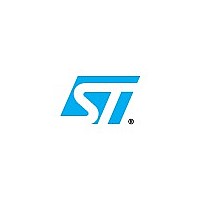ST72321AR7 STMicroelectronics, ST72321AR7 Datasheet - Page 44

ST72321AR7
Manufacturer Part Number
ST72321AR7
Description
8-BIT MCU WITH NESTED INTERRUPTS, FLASH,10-BIT ADC, FIVE TIMERS, SPI, SCI, I2C INTERFACE
Manufacturer
STMicroelectronics
Datasheet
1.ST72321J7.pdf
(193 pages)
Specifications of ST72321AR7
Hdflash Endurance
100 cycles, data retention
Clock Sources
crystal/ceramic resonator oscillators, internal RC oscillator, clock security system and bypass for external clock
Four Power Saving Modes
Halt, Active-Halt,Wait and Slow
Main Clock Controller With
Real time base, Beep and Clock-out capabilities
Two 16-bit Timers With
2 input captures, 2 output compares, external clock input on one timer, PWM and pulse generator modes
8-bit Pwm Auto-reload Timer With
2 input captures, 4 PWM outputs, output compare and time base interrupt, external clock with event detector
- Current page: 44 of 193
- Download datasheet (4Mb)
ST72321Rx ST72321ARx ST72321Jx
POWER SAVING MODES (Cont’d)
8.4.2 HALT MODE
The HALT mode is the lowest power consumption
mode of the MCU. It is entered by executing the
‘HALT’ instruction when the OIE bit of the Main
Clock Controller Status register (MCCSR) is
cleared (see
tails on the MCCSR register).
The MCU can exit HALT mode on reception of ei-
ther a specific interrupt (see Table 8, “Interrupt
Mapping,” on page 37) or a RESET. When exiting
HALT mode by means of a RESET or an interrupt,
the oscillator is immediately turned on and the 256
or 4096 CPU cycle delay is used to stabilize the
oscillator. After the start up delay, the CPU
resumes operation by servicing the interrupt or by
fetching the reset vector which woke it up (see
ure
When entering HALT mode, the I[1:0] bits in the
CC register are forced to ‘10b’to enable interrupts.
Therefore, if an interrupt is pending, the MCU
wakes up immediately.
In HALT mode, the main oscillator is turned off
causing all internal processing to be stopped, in-
cluding the operation of the on-chip peripherals.
All peripherals are not clocked except the ones
which get their clock supply from another clock
generator (such as an external or auxiliary oscilla-
tor).
The compatibility of Watchdog operation with
HALT mode is configured by the “WDGHALT” op-
tion bit of the option byte. The HALT instruction
when executed while the Watchdog system is en-
abled, can generate a Watchdog RESET (see
tion 14.1 on page 175
Figure 28. HALT Timing Overview
44/193
[MCCSR.OIE=0]
INSTRUCTION
RUN
29).
HALT
HALT
section 10.2 on page 57
256 OR 4096 CPU
CYCLE DELAY
INTERRUPT
for more details).
RESET
OR
VECTOR
FETCH
for more de-
RUN
sec-
Fig-
Figure 29. HALT Mode Flow-chart
Notes:
1. WDGHALT is an option bit. See option byte sec-
tion for more details.
2. Peripheral clocked with an external clock source
can still be active.
3. Only some specific interrupts can exit the MCU
from HALT mode (such as external interrupt). Re-
fer to Table 8, “Interrupt Mapping,” on page 37 for
more details.
4. Before servicing an interrupt, the CC register is
pushed on the stack. The I[1:0] bits of the CC reg-
ister are set to the current software priority level of
the interrupt routine and recovered when the CC
register is popped.
N
HALT INSTRUCTION
WATCHDOG
WDGHALT
(MCCSR.OIE=0)
RESET
1
INTERRUPT
Y
1)
3)
ENABLE
256 OR 4096 CPU CLOCK
OR SERVICE INTERRUPT
0
FETCH RESET VECTOR
OSCILLATOR
PERIPHERALS
CPU
I[1:0] BITS
OSCILLATOR
PERIPHERALS
CPU
I[1:0] BITS
OSCILLATOR
PERIPHERALS
CPU
I[1:0] BITS
N
CYCLE
RESET
Y
WATCHDOG
DELAY
DISABLE
2)
XX
XX
OFF
OFF
OFF
OFF
ON
ON
ON
ON
ON
10
4)
4)
Related parts for ST72321AR7
Image
Part Number
Description
Manufacturer
Datasheet
Request
R

Part Number:
Description:
STMicroelectronics [RIPPLE-CARRY BINARY COUNTER/DIVIDERS]
Manufacturer:
STMicroelectronics
Datasheet:

Part Number:
Description:
STMicroelectronics [LIQUID-CRYSTAL DISPLAY DRIVERS]
Manufacturer:
STMicroelectronics
Datasheet:

Part Number:
Description:
BOARD EVAL FOR MEMS SENSORS
Manufacturer:
STMicroelectronics
Datasheet:

Part Number:
Description:
NPN TRANSISTOR POWER MODULE
Manufacturer:
STMicroelectronics
Datasheet:

Part Number:
Description:
TURBOSWITCH ULTRA-FAST HIGH VOLTAGE DIODE
Manufacturer:
STMicroelectronics
Datasheet:

Part Number:
Description:
Manufacturer:
STMicroelectronics
Datasheet:

Part Number:
Description:
DIODE / SCR MODULE
Manufacturer:
STMicroelectronics
Datasheet:

Part Number:
Description:
DIODE / SCR MODULE
Manufacturer:
STMicroelectronics
Datasheet:

Part Number:
Description:
Search -----> STE16N100
Manufacturer:
STMicroelectronics
Datasheet:

Part Number:
Description:
Search ---> STE53NA50
Manufacturer:
STMicroelectronics
Datasheet:

Part Number:
Description:
NPN Transistor Power Module
Manufacturer:
STMicroelectronics
Datasheet:

Part Number:
Description:
DIODE / SCR MODULE
Manufacturer:
STMicroelectronics
Datasheet:










